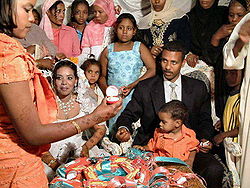- Nubian people
-
For the breed of goat of the same name, see Anglo-Nubian.
Nubians 
Total population 1.7 million speakers of Nubian languages (SIL estimate as of 1996) Regions with significant populations  Sudan
Sudan
 Egypt
EgyptLanguages Kenuzi-Dongola, Nobiin, other Nubian languages; Sudanese Arabic, Egyptian Arabic, Sa'idi Arabic,
Religion The Nubians (Arabic: نوبي, Nuubi) are an ethnic group originally from northern Sudan, and southern Egypt now inhabiting North Africa and some parts of East Africa.
The Nubian people in Sudan inhabit the region between Wadi Halfa in the north and Aldaba in the south. The main Nubian groups from north to south are the Halfaweyen, Sikut, Mahas, and Danagla. They speak different dialects of the Nubian language.
In ancient times Nubians were depicted by Egyptians as having very dark skin, often shown with hooped earrings and with braided or extended hair.[1] Ancient Nubians were famous for their vast wealth,[citation needed] their trade between Central Africa and the lower Nile valley civilizations,[citation needed] including Egypt, their skill and precision with the bow[2], their 23-letter alphabet,[citation needed] the use of deadly poison on the heads of their arrows,[citation needed] their great military[citation needed], their advanced civilization,[citation needed] and their century-long rule over the united upper and lower Egyptian kingdoms.[citation needed]
Contents
History
Further information: NubiaNubians are the people of southern Egypt and northern Sudan, settling along the banks of the Nile from Aswan. Their Nubian language is an Eastern Sudanic language, part of the Nilo-Saharan phylum.
The Old Nubian language is attested from the 8th century, and is thus the oldest recorded language of Africa outside of the Afro-Asiatic group. It was the language of the Noba nomads who occupied the Nile between the First and Third Cataracts and the Makorae nomads who occupied the land between the Third and Fourth Cataracts following the collapse of the Kingdom of Kush sometime in the 4th century CE. The Makorae were a separate tribe who eventually conquered or inherited the lands of the Noba: they established a Byzantine-influenced state called the Kingdom of Makuria which administered the Noba lands separately as the eparchy of Nobadia. Nobadia was converted to Miaphysitism by the Orthodox priest Julian and Bishop Longinus of Constantinople, and thereafter received its bishops from the Pope of Alexandria.
Present day
The influx of Arabs to Egypt and Sudan had contributed to the suppression of the Nubian identity following the collapse of the last Nubian kingdom in 1900. A major part of the modern Nubian population were Arabised. The Jaa'leen-the majority of Northern Sudanese and some Donglawes in Sudan, Kenuz and Koreskos in Egypt all claimed to be Arabs. However the vast majority of the Nubians converted to Islam, and Arabic became their main language, in addition to their indigenous old Nubian language. The unique characteristics of Nubians are their culture (dress, dances, traditions and music) as well as their indigenous language which is a common feature of most Nubians.
Prominent Nubians
- Alara of Nubia, founder of the Twenty-fifth dynasty of Egypt
- Taharqa, Pharaoh of the Twenty-fifth dynasty
- Anwar Sadat, Late third President of Egypt ( Egyptian Nubian father, Sudanese Nubian mother)
- Gaafar Nimeiry, Former Sudanese president
- Mohammed Wardi, Singer
- Mohamed Mounir, Singer
- Ali Hassan Kuban, Singer and musician
- Hamza El Din, Singer and musicologist
- Khalil Kalfat, Literary critic, political and economic thinker and writer
- Abdallah Khalil, Ex-Sudanese Prime Minister, co-founder of the White Flag League, co-Founder and ex-general secretary of the Umma Party
- Mohamed Hussein Tantawi Soliman, Egyptian Field Marshal and statesman, commander-in-chief of the Egyptian Armed Forces, de facto head of state of Egypt
- Jamal Muhammad Ahmed, Sudanese diplomat, statesmen, author, poet
- Ibrahim Ahmad, Prominent Sudanese politician, first Sudanese head of the University of Khartoum, first Secretary of Treasury, the first chairman of the Bank of Sudan, co-founder of Umma party, Author and negotiator of the Sudanese Declaration of Independence
- Abdul-Rahman al Mahdi, Grandson of the Mahdi, Prominent sudanese Satesman
- Muhammad Ahmad, 19 century sufi sheikh and self-proclaimed Mahdi
- Jamal Abu Seif, Founder of Itihad, the first politically-active group in the Sudan and predecessor of the famous White Flag League
- Sheikh Khalil Ateeg, Founder of the Day'fiya Ismailiya Sufi tariqa in the Sudan
- Abdu Dahab Hassanein, Founder of the Sudanese Communist Party
- Dawwod Abdul-Latif, First mayor of Khartoum
- Mohammed Tawfeg, ex-Minister of Exterior, ex-Minister of the Media
- Mo Ibrahim, Sudanese-born British mobile communications entrepreneur, one of the richest men in the United Kingdom
- Idris Ali, Egyptian novelist and short story writer
- Ibrahim Awad, Late Sudanese Musician .
- Osama Abdul Latif, Sudanese businessman, Chairman of DAL group
- Shikabala, Mahmoud Abdel Razek Fadlallah, Egyptian footballer who currently plays for Egyptian Premier League club Zamalek SC,
References
- Rouchdy, Aleya (1991). Nubians and the Nubian Language in Contemporary Egypt: A Case of Cultural and Linguistic Contact. Leiden: Brill Academic Publishers. ISBN 9004091971.
- Valbelle, Dominique; Charles Bonnet (2007). The Nubian Pharaohs: Black Kings on the Nile. Cairo: American University in Cairo Press. ISBN 977416010X.
- Warnock Fernea, Elizabeth; Robert A. Fernea (1990). Nubian Ethnographies. Chicago: Waveland Press Inc.. ISBN 0881334804.
- Black Pharaohs - National Geographic Feb 2008
External links
Categories:- Nubia
- Indigenous peoples of North Africa
- Ethnic groups in Sudan
- Ethnic groups in Egypt
- Ethnic groups in the Arab League
- Sudanese people of Nubian descent
Wikimedia Foundation. 2010.
